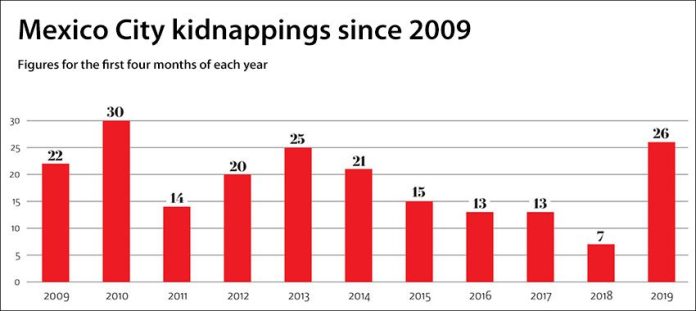The number of kidnapping cases in Mexico City surged 271% in the first four months of 2019, while public security funding for the capital’s 16 boroughs has been slashed.
There were 26 abduction cases between January and April, according to the National Public Security System, compared to just seven in the same period last year.
If it continues at the same rate, the year will end with 78 kidnapping cases in the capital, which would be the highest number since 2009.
The surge recorded so far this year far exceeds the nationwide increase of 28% and coincides with a reduction in federal funding for security.
Mexico City’s 16 boroughs were allocated 176.5 million pesos (US $9.2 million) this year via the federal government’s security enhancement program known as Fortaseg, a reduction of 53% compared to the 378.1 million pesos they received in 2018.
Sprawling Iztapalapa in the east of the city, central Cuauhtémoc and Gustavo A. Madero in the north suffered the biggest budget cuts, and 17 of the 26 kidnappings in the first four months of the year – 65% or two out of every three – occurred in those boroughs.
Isabel Miranda de Wallace, president of the non-governmental organization Alto al Secuestro (Stop the Kidnappings), believes that the budget cuts – part of President López Obrador’s wider austerity measures – have made existing policing deficiencies even worse.
In January, she wrote to Mexico City Mayor Claudia Sheinbaum to warn her about the risks posed by funding cuts to the police’s anti-kidnapping unit.
De Wallace said that Mexico City police are not only operating with scant resources but with poor quality equipment, adding that they don’t have the technology needed to effectively combat and investigate kidnapping.
Police in the capital have come under fire this month for their response to a kidnapping case in which 22-year-old student Norberto Ronquillo was killed.
The victim’s family claim that in the 72 hours after he was abducted, police failed to properly investigate the case. Officers also allegedly failed to correctly secure the crime site and are under investigation for possible collusion with the perpetrators.
The National Citizens’ Observatory (ONC), an independent organization that monitors security conditions, said the case is an “example of how bad decisions end lives.”
The organization also noted that the federal government has cut the budget of the National Anti-Kidnapping Coordination by 30% and failed to officially appoint someone to head it.
It is clear that combating this crime “is not a priority for the new administration,” the ONC said.
The Ronquillo case has reopened old wounds for Alejandro Martí, whose 14-year-old son was kidnapped and murdered in Mexico City in 2008. He blamed the crime on “brutal impunity” and systemic flaws that deter immediate action or reaction by authorities.
He wrote on Twitter: “Mexico is bleeding as never before in history” and “the terror continues in spite of everything.”
Martí became an advocate for legal reforms after his son’s death and founded México SOS, a foundation dedicated to end the crisis of insecurity.
Source: Milenio (sp), El Universal (sp)
